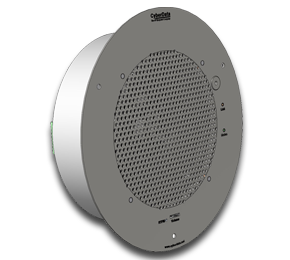011180/011181 SIP Talk-Back Speaker (Replacement Product is 011398)
Part Number: 011180
MSRP: $0.00
- Description
- Features
- Specs
- FAQs
- Installation
- Downloads
- Push-to-Talk
- Web-based configuration
- Web-based firmware upgradeable
- Plenum-rated enclosure
- Small footprint
- High efficiency speaker driver
- PoE 802.3af-enabled (Powered-over-Ethernet)
- Network and external speaker volume control
- Optional external call button and LED indicator
- Monitor Mode
| Protocol | SIP RFC 3261 Compatible |
| Ethernet I/F | 10/100 Mbps |
| Power Input | PoE 802.3af |
| Operating Temperature | -10 degrees C to 50 degrees C (14 degrees F to 122 degrees F) |
| Payload Types | G711 A-Law and u-Law + Singlewire HD |
| Output Level | 10 Watts Peak Power |
| Sensitivity | 96dB / 1W / 1M S.P. Level |
| Dimensions | 9" x 2.4" |
| Warranty | 2 Year Limited |
| Part Number Standard Color | 011180, RAL 9002, Gray White |
| Part Number Optional Color | 011181, RAL 9003, Signal White |
Are there a set of specs. or standards that define proper spacing for your IP Speakers along a hallway?
In a ceiling mount, you would want about 1 speaker per every 10-15 feet of hallway length. If you used the paging amp you could use 3 paging amps per 100 feet. This assumes average ambient noise and surface attenuation levels.
I am unable to connect with the unit when it is plugged into a Cisco SLM 224P switch.
The cables or switch ports that you are connecting to are set in switch or hub mode instead of endpoint stations. The MDIX setting needs to be changed to MDI since our VoIP products are end stations. From the Cisco SLM 224P User Guide:
Change to MDI: MDI/MDIX displays the Media Dependent Interface (MDI) / Media Dependent Interface with Crossover (MDIX) status on the port. Hubs and switches are deliberately wired the opposite of the way end stations are wired, so that when a hub or switch is connected to an end station, a straight through Ethernet cable can be used, and the pairs are matched up properly. When two hubs or switches are connected to each other, or two end stations are connected to each other, a crossover cable is used to ensure that the correct pairs are connected. The possible field values are: MDIX
Use for hubs and switches. MDI Use for end stations.I have a Cisco 6513 switch. When I plug in a CyberData VoIP device, the device constantly reboots and will not register to the SIP server.
Please adjust the switch power selection to Power inline static, as opposed to Power inline dynamic. This will allow the device to continuously receive 15.4W of power.
I have a Cisco Catalyst series switch. How do I set the unit so that it can use PoE (under 15.4w) instead of an external power source?
There are known PoE limitations with third party devices on the Cisco Catalyst series switches. This includes the 2500, 3500, and 6500 series switches. It's important to keep in mind that CyberData devices are considered third party devices and require switch port setting adjustments. Be sure to turn power policing off if it has been enabled on your switch. Power policing is disabled by default. Also, configure your port for no shutdown. Use the following command to configure inline power: power inline static max 15400.
What IP phones do you recommend for setting up a Peer to Peer with this device?
Typical Installation 1

Typical Installation 2
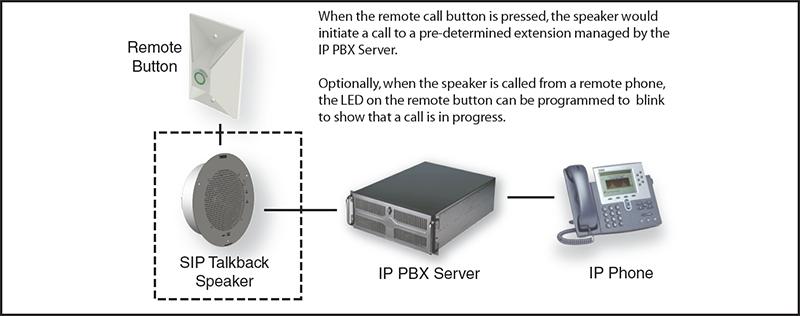
Call Button Mounting
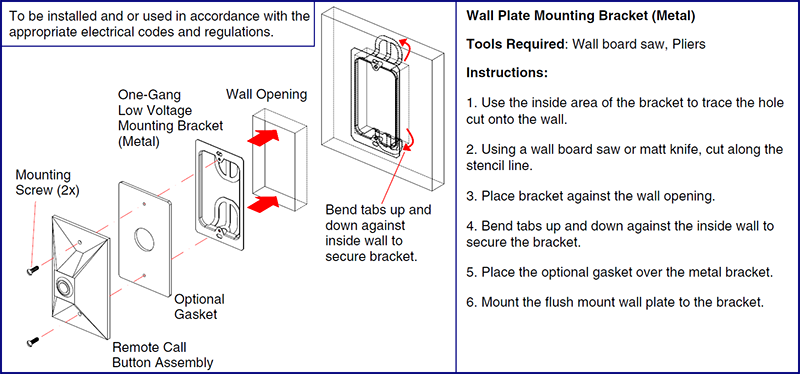
Call Button Connection
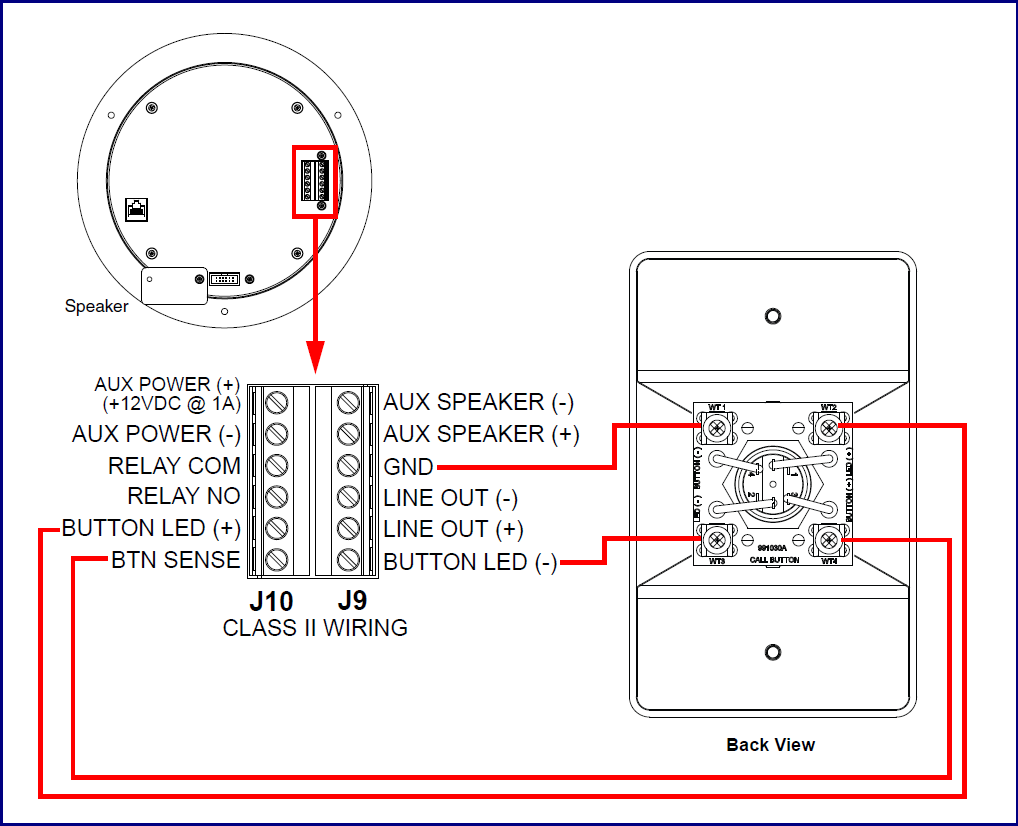
Auxilliary Analog Speaker
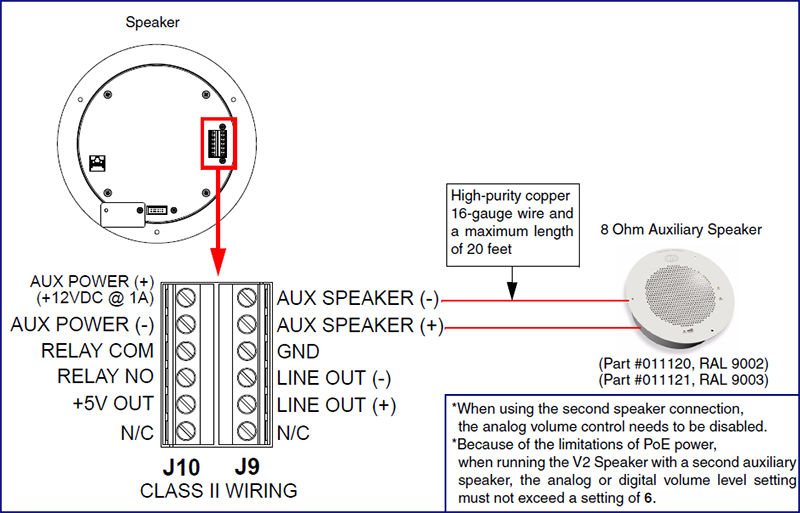
Ceiling Mounting
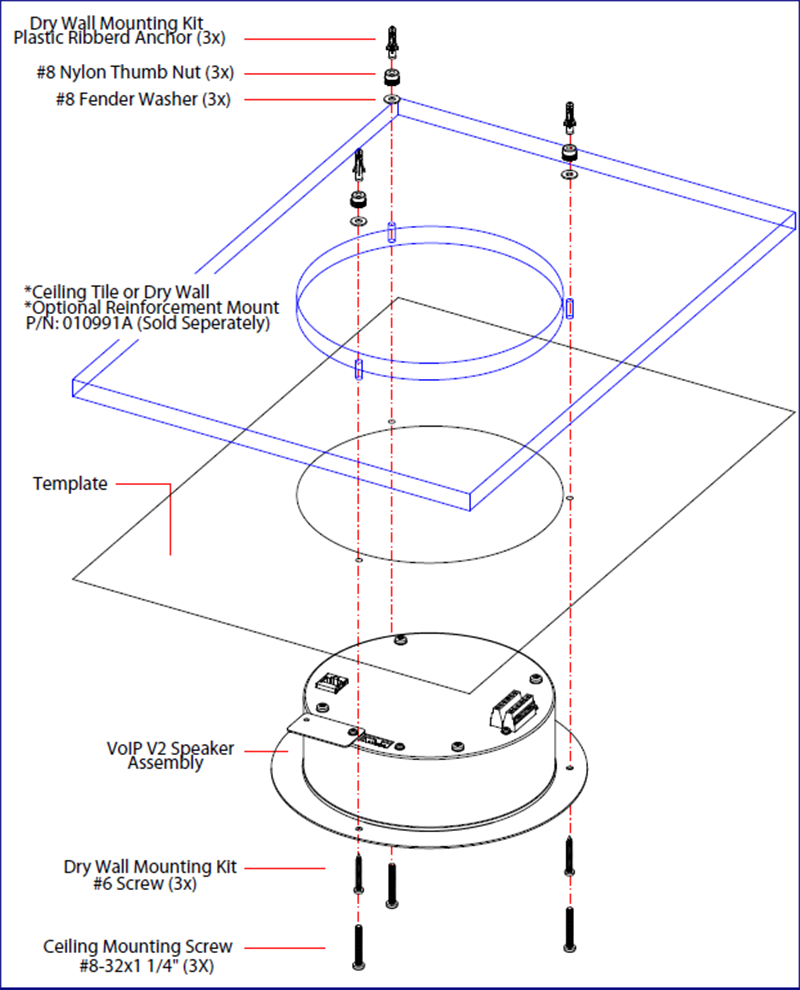
Mounting Options
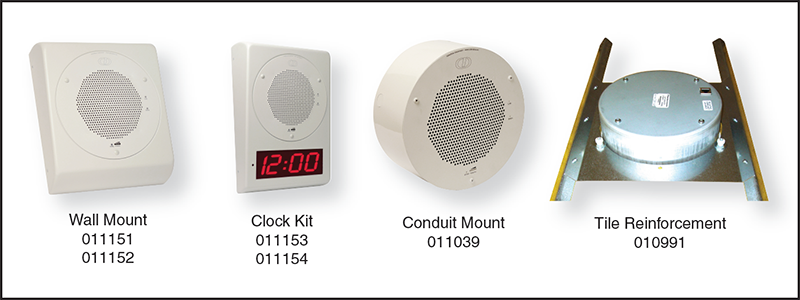
Description
Features
- Push-to-Talk
- Web-based configuration
- Web-based firmware upgradeable
- Plenum-rated enclosure
- Small footprint
- High efficiency speaker driver
- PoE 802.3af-enabled (Powered-over-Ethernet)
- Network and external speaker volume control
- Optional external call button and LED indicator
- Monitor Mode
Specs
| Protocol | SIP RFC 3261 Compatible |
| Ethernet I/F | 10/100 Mbps |
| Power Input | PoE 802.3af |
| Operating Temperature | -10 degrees C to 50 degrees C (14 degrees F to 122 degrees F) |
| Payload Types | G711 A-Law and u-Law + Singlewire HD |
| Output Level | 10 Watts Peak Power |
| Sensitivity | 96dB / 1W / 1M S.P. Level |
| Dimensions | 9" x 2.4" |
| Warranty | 2 Year Limited |
| Part Number Standard Color | 011180, RAL 9002, Gray White |
| Part Number Optional Color | 011181, RAL 9003, Signal White |
FAQs
Are there a set of specs. or standards that define proper spacing for your IP Speakers along a hallway?
In a ceiling mount, you would want about 1 speaker per every 10-15 feet of hallway length. If you used the paging amp you could use 3 paging amps per 100 feet. This assumes average ambient noise and surface attenuation levels.
I am unable to connect with the unit when it is plugged into a Cisco SLM 224P switch.
The cables or switch ports that you are connecting to are set in switch or hub mode instead of endpoint stations. The MDIX setting needs to be changed to MDI since our VoIP products are end stations. From the Cisco SLM 224P User Guide:
Change to MDI: MDI/MDIX displays the Media Dependent Interface (MDI) / Media Dependent Interface with Crossover (MDIX) status on the port. Hubs and switches are deliberately wired the opposite of the way end stations are wired, so that when a hub or switch is connected to an end station, a straight through Ethernet cable can be used, and the pairs are matched up properly. When two hubs or switches are connected to each other, or two end stations are connected to each other, a crossover cable is used to ensure that the correct pairs are connected. The possible field values are: MDIX
Use for hubs and switches. MDI Use for end stations.I have a Cisco 6513 switch. When I plug in a CyberData VoIP device, the device constantly reboots and will not register to the SIP server.
Please adjust the switch power selection to Power inline static, as opposed to Power inline dynamic. This will allow the device to continuously receive 15.4W of power.
I have a Cisco Catalyst series switch. How do I set the unit so that it can use PoE (under 15.4w) instead of an external power source?
There are known PoE limitations with third party devices on the Cisco Catalyst series switches. This includes the 2500, 3500, and 6500 series switches. It's important to keep in mind that CyberData devices are considered third party devices and require switch port setting adjustments. Be sure to turn power policing off if it has been enabled on your switch. Power policing is disabled by default. Also, configure your port for no shutdown. Use the following command to configure inline power: power inline static max 15400.
What IP phones do you recommend for setting up a Peer to Peer with this device?
Installation
Typical Installation 1

Typical Installation 2

Call Button Mounting

Call Button Connection

Auxilliary Analog Speaker

Ceiling Mounting

Mounting Options

Downloads



